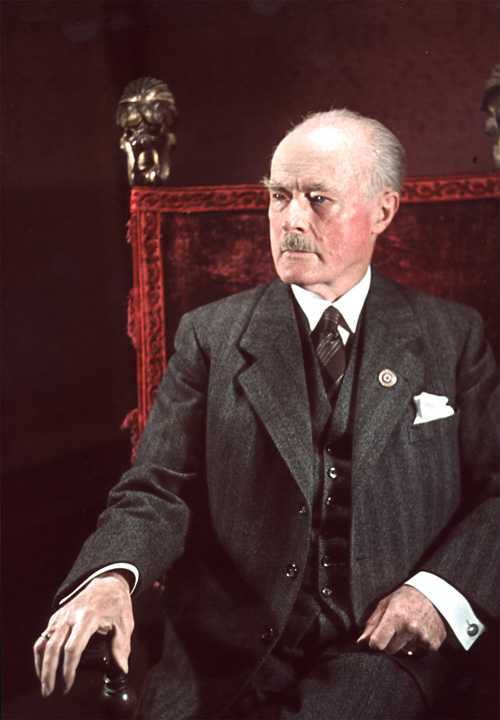
German Forces
Man of Steel.
Corbis.
Impressive, yet pathetic, this studio portrait of Gustav Krupp von Bohlen und Halbach, probably taken 1941/'42. Gustav's health had declined seriously from 1939, when he began to exhibit signs of dementia; he suffered a stroke which substantially paralysed him in 1941. During that period, control of his business largely passed to his son, Alfred, who assumed full control in 1943. As to the "business" - this was of course, the arms manufacturing behemoth, Friedrich Krupp AG, which played a role in modern German history that would be difficult to overestimate, and conveyed on Gustav the unique distinction of being charged with war crimes in the wake of two world wars. Gustav von Bohlen und Halbach was not born to manage an armaments empire. He was a member of a fairly minor noble family which was, nonetheless, well-connected with a presence at the Court of Kaiser Wilhelm II. When Destiny beckoned, in 1907, Gustav was serving his apprenticeship, so to speak, in the Imperial Diplomatic Service as a Secretary to the Kaiser's Embassy to the Holy See (Vatican). In this case, Destiny took the form of Bertha, effective sole heiress to her father, Friedrich Krupp. Not that this was a matter of romance. When Bertha's father, Friedrich, committed suicide in 1902, it was generally considered inappropriate that a woman (and Bertha was only 16 at the time) should control an armaments firm vital to the German military machine. The Kaiser, who was particularly attached to this point, took it upon himself to look around for a suitable spouse - and his choice fell on Gustav. The couple were married in May, 1907, two months after Bertha's 21st birthday. The groom was, no doubt, pleased to discover that his bride was a bit of a looker, apart from unimaginably wealthy. In any case, the marriage turned out to be a very happy one. At the wedding, the guest of honour, the Kaiser, announced that Gustav would be allowed to add "Krupp" to his name. Regarding the business, the arrangement was that Bertha would continue to own her shares in the company (she owned all but a handful of them), and that Gustav would become Chairman of the Board, effectively running the company on her behalf. Like the marriage, this arrangement worked, perhaps surprisingly, well. Diplomat Gustav took to the role of armaments magnate like a duck to water. As to the character of Gustav's management of the firm through to 1939, he seems to have adopted the principle that his firm should function as a sort of subsidiary country, always doing it utmost to serve (and profit from) the current powers-that-be. Krupp played an indispensable role in the Kaiser's war, producing everything from cartridges to submarines. Hardly had the mud settled after WW1 when Krupp began secret preparation for German rearmament, colluding with the Reichswehr in its surreptitious military relationship with the Soviet Union, and developing new weapons through non-German subsidiaries in Sweden (Bofors) and in the Netherlands (Gustav's country of birth). This placed it well to profit when rearmament actually came; by 1939 (when Gustav's health failed), Krupp stood as an armaments/industrial colossus, again indispensable to Hitler's war. Unlike some other industrial magnates, Gustav (a convinced Monarchist personally) did not immediately take to Hitler and the Nazis, and was distinctly unimpressed with the notion of appointing Hitler as Chancellor on 30 January, 1933. However, the actions of the Nazis in their early months of power seem to have persuaded him that they were, in fact, a competent and effective political force and a potential bulwark against Bolshevism in Germany. Accordingly, he quickly became an enthusiastic National Socialist, and funded the Party's successful campaign for the Reichstag general election of March, 1933, which led directly to Hitler's assumption of dictatorial power. As the mud settled again after WW2, Gustav was again accused (indeed indicted) for war crimes. It would be incorrect to say that he "found himself indicted", because by this time he was suffering from serious dementia, and would probably not have noticed. In view of his manifest ill-health, the charges were dropped. Gustav Krupp von Bohlen und Halbach died in January, 1950, at the age of 79. Best regards, JR.
2593 Views
9/4/2014
